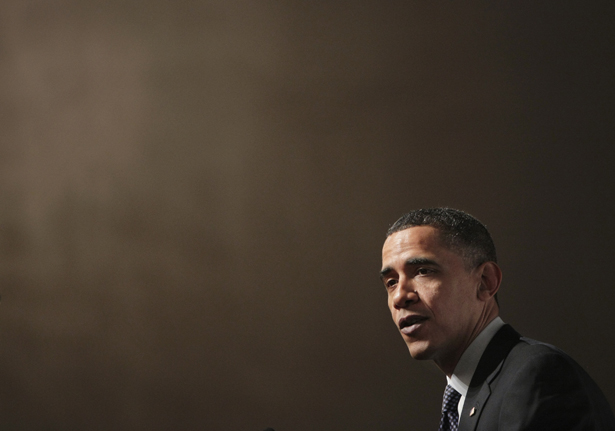
President Barack Obama. (AP Photo/J. Scott Applewhite)
This story originally appeared at Truthdig. Robert Scheer is the author of The Great American Stickup: How Reagan Republicans and Clinton Democrats Enriched Wall Street While Mugging Main Street (Nation Books).
It may come to naught—calls for peace so rarely still the drums of war—but there was a moment Monday when the odds for sanity seemed to finally stand a chance of prevailing. It came when President Obama acknowledged the Russian proposal for Syria to avert war by agreeing to destroy its chemical weapons stock as “a potentially positive development.” It was quintessentially an un-Bush moment when suddenly this presidential “decider” seemed possessed of a brain capable of reversing his disastrous course.
It helped that a majority of the public, and even many of its representatives in Congress, had expressed strong opposition to entering into a civil war without a plausibly positive outcome. According to The New York Times/CBS News poll conducted over the weekend, “nearly 9 in 10 Americans are concerned that United States military action in Syria will become a long and costly mission” and would lead to “a more widespread war in the Middle East.” Imperial hubris has been soundly rejected by a properly chastened war-weary public, and nation building, particularly in that part of the world, is now most often treated as an expectation that is indelibly cursed.
The bipartisan rejection of the inevitability of a military response has been stunning in its geographical reach, and as Peggy Noonan, a leading Republican intellectual as well as a former top speechwriter for Ronald Reagan, observed in her Wall Street Journal column Saturday: “The American people do not support military action…. Widespread public opposition is in itself reason not to go forward.” Although underscoring the need to “rebuke those who used the weapons, condemn their use, and shun the users…a military strike is not the way, and not the way for America,” she wrote.
She is right. The use of chemical weapons cannot be ignored, even though the US did just that decades ago when then-Mideast special envoy Donald Rumsfeld embraced Saddam Hussein after he deployed those heinous weapons on his own people and in his war with Iran. A strong response to the use of those weapons is in order, but instead of more violence that would inevitably kill innocent people, why not give peace a chance? At the very least, even if the Syrian government continues to deny responsibility for the chemical attacks, it must abandon its arsenal of these weapons that are inherently inhuman.
The foreign minister of Russia came up with exactly that proposal. Speaking with the authority of Syria’s sole significant arms supplier, Sergey V. Lavrov seized upon Secretary of State John Kerry’s purely rhetorical point that Syria could abandon its chemical weapons supply and asked, why not? It was a serious plan, given that it had been previewed in a phone conversation between Lavrov and Kerry and that Syria’s foreign minister, who was in Moscow at the time, welcomed the sentiment. Walid al-Moallem, who is also Syria’s deputy prime minister, endorsed Lavrov’s proposal because of “the concern of the Russian leadership about the life of our citizens and the security of our country,” he told reporters Monday in Moscow.
Moallem, at least, took it as a lifeline to the Assad government that just might be grabbed, and suddenly the peacemakers had their talking point. Better to explore the possibility of peaceful disarmament than to plunge into the “unbelievably small” war that Kerry was prattling about and that Obama reminded would not be a “pinprick.” Perhaps mindful of the innocent civilians killed by the drone attacks he has authorized, Obama declared: “The US does not do pinpricks. Our military is the greatest the world has ever known. And when we take even limited strikes, it has an impact on a country like Syria.”
And on the Syrian people, who will inevitably be sacrificed as collateral damage in even the most surgical of US strikes. It is they who are the victims of the extreme violence in their country inflicted by both the government and the rebels, and it is absurd to suggest that increased violence administered by the US will ameliorate their condition.
Surely President Obama can recall his own earlier warnings about the danger of such military adventures, and the disarray in Libya is a constant reminder that even once promising attacks quickly lose their luster. He has also realized that it is necessary to finally bury the legacy of the Cold War and recognize, as the Chechnya-connected Boston bombing demonstrated, the common stake in dealing effectively with terrorism. It is also Obama who acknowledged that the US shares with Russia the ugly reputation of being the developers and possessors of nuclear weapons of mass destruction that make the Syrian arsenal seem insignificant in comparison.
Perhaps this bold Russian initiative will have been discarded as an option by the time this is read, but without such cooperation between these former enemies who competed so long and destructively in the Mideast, there is no hope for genuine peace throughout that region.
Katrina vanden Heuvel argues for 'forceful diplomacy' in Syria.


